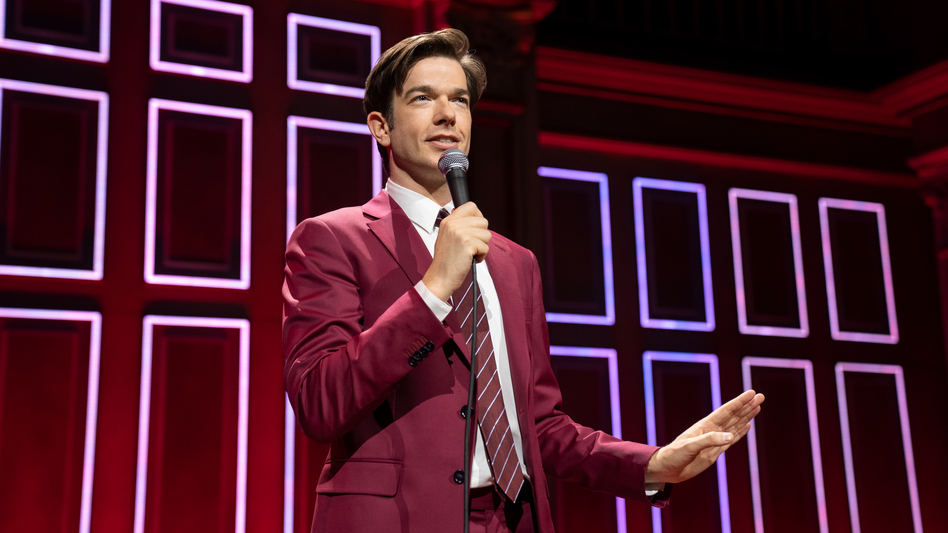The past few years have delivered a particular type of stand-up special, in which comedians—following a very personal, high-profile media controversy—use the mic to delve into their feelings. Call it the Drake-ification of comedy.
Aziz Ansari opened up about the fallout of his sexual misconduct allegations in his 2019 special. Earlier this year, Chris Rock’s Selective Outrage gave us his first public response to Will Smith and the now-infamous slapgate at the 2022 Oscars.
John Mulaney’s Baby J, released on Netflix in late April, is the latest entry in this genre of confessional comedy for our very online age. And it’s one of the best.
Leading up to 2020, Mulaney had any comedian’s dream resumé: a writing stint at Saturday Night Live; two Netflix specials; and an eccentric repertoire of stand-alone projects, from a Broadway show, to a spoof kids variety special, to (for my money) the best opening monologue at the Independent Spirit Awards.
But Mulaney’s success was thrown into limbo that December, following a very public drug relapse. As he tells in Baby J, the Saturday morning he checked into rehab he had in his winter coat, “a full baggie of 30mg Adderall, a full baggie of Xanax, 3g of cocaine, and $2,000 in cash … I had other plans that weekend.”
With his new special, Mulaney, now 40 years old, sets up a two-fold challenge for himself. First, he has to deliver laughs about his admittedly serious (though by all accounts past) drug problem. Deliver them he does.
One of Mulaney’s biggest strengths lies in his acute generational observations. He’s able to take seemingly routine episodes of the millennial/early Zoomer collective mind as jumping-off points with ease. He can intertwine an aside about that friend who unknowingly texts and FaceTimes you from a “lowercase abomination” iCloud email address (“Are you calling from a child’s iPad?!”), all while recounting his 2020 intervention.
Mulaney also incorporates a relatively untapped skill—an impression, this time of Oscar-winner Al Pacino. Impressions are never central to his comedy (though he did previously take on the 42nd president of these United States William Jefferson Clinton), but one of Baby J’s funniest moments involves an appropriately scratchy, loud, Scent of a Woman-esque rendition of the legendary actor, whom a rehab nurse mistakenly thought was calling Mulaney one night (the call was actually from comedian Pete Davidson, jokingly mislabeled in Mulaney’s contacts).
Unsurprisingly, the vast majority of Mulaney’s revelatory special recounts his struggles with addiction, which is the second challenge Mulaney sets up for himself: broaching the subject while maintaining some semblance of the persona he’s built over the years.
Mulaney’s career has been largely defined by his self-deprecating, yet nevertheless happy-go-lucky vibe. He’s not abrasive, never picks unnecessary fights, holds back overly political punches. As he admits in Baby J, he’s somewhat crafted a personality out of a concern for likeability.
Needless to say, describing a drug relapse involves talking about much that makes him less-than-likable: bitterness toward his friends, prescription drug abuse, and reckless lying and spending to satiate his addiction.
It should give us pause that an exposé feels almost like a requirement of our very online times. If a significant chunk of the audience expects some sort of tell-all as tribute for the attention they’ve given, then with greater notoriety comes the risk of ever more notorious falls. Heavy is the hand that tweets the most.
Some conversations since Baby J’s release have focused on this second aspect of Mulaney’s special. Is he really being forthcoming about his problems? Or is this Mulaney’s latest, albeit veiled, attempt to get you to like him?
In part, Mulaney himself answers the question. After recounting a story about pawning a Rolex watch for drug money, the comedian says, “Just remember, [that story is] one I’m willing to tell you.” Sure, Baby J opens up—but only to a point. Mulaney still cares about being liked.
But in another regard, whether Baby J is truly raw or subtly coy misses a key part of its appeal. Mulaney’s comedy has cross-generational appeal, but it is particularly resonant with the twenty- and thirty-somethings who’ve grown up with him over the years. Even if, as he jokes in Baby J, none of his fellow rehab patients recognized him, he’s become a cultural staple for those who do.
In that regard, Mulaney’s latest is a joy not just because it shows off his signature comedic timing and voice; it’s a joy because one can’t help but be glad that despite everything he’s gone through, he is still the same comedian his audience loves to like. It’s a relief to see Baby J (Mulaney himself) off the streets and back onstage.







Please note that we at The Dispatch hold ourselves, our work, and our commenters to a higher standard than other places on the internet. We welcome comments that foster genuine debate or discussion—including comments critical of us or our work—but responses that include ad hominem attacks on fellow Dispatch members or are intended to stoke fear and anger may be moderated.
With your membership, you only have the ability to comment on The Morning Dispatch articles. Consider upgrading to join the conversation everywhere.